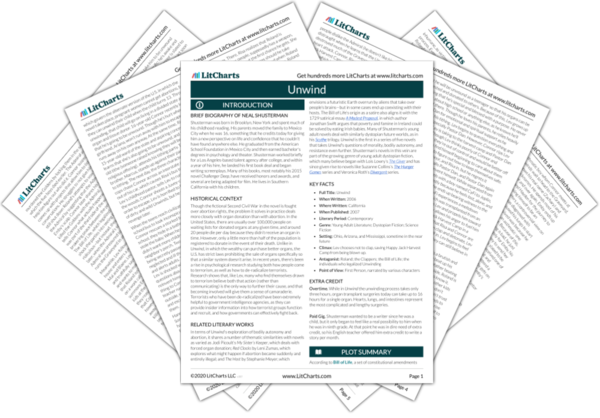The Bill of Life represents the incompetence of the government in the novel. Admiral Dunfee explains to Connor that he and his fellows in the Army initially developed the Bill of Life during the Heartland War as a satire, with the intention of impressing upon both the pro-life and the pro-choice sides of the U.S.’s abortion debate that they were being ridiculous and taking the conflict way too far. This backfired, however, when neither side got the joke and the Bill of Life became law—law that is arguably more violent, nonsensical, and unhelpful than even the Heartland War ever was. Because of this, the Bill of Life comes to encapsulate how ill-equipped the government and the law in the world of the novel are to deal with issues of this kind. Moreover, to individuals like Connor and Risa who were born after the Heartland War and know nothing else, the status and seeming normalcy of the Bill of Life in people’s everyday lives speaks to the way in which even policies that are cruel and nonsensical can become normalized and accepted by society.
The Bill of Life Quotes in Unwind
The mother is nineteen, but she doesn’t feel that old. She feels no wiser, no more capable of dealing with this situation, than a little girl. When, she wonders, did she stop being a child? The law says it was when she turned eighteen, but the law doesn’t know her.

Unlock explanations and citation info for this and every other Unwind quote.
Plus so much more...
Get LitCharts A+“The unborn have souls. They have their souls from the moment they get made—the law says.”
Connor doesn’t want to get into it again with Emby, but he can’t help himself. “Just because the law says it, that doesn’t make it true.”
“Yeah, well, just because the law says it, that doesn’t make it false, either. It’s only the law because a whole lot of people thought about it, and decided it made sense.”
“Then we proposed the idea of unwinding, which would terminate unwanteds without actually ending their lives. We thought it would shock both sides into seeing reason—that they would stare at each other across the table and someone would blink. But nobody blinked. The choice to terminate without ending life—it satisfied the needs of both sides. The Bill of Life was signed, the Unwind Accord went into effect, and the war was over. Everyone was so happy to end the war, no one cared about the consequences.”
“Of course, if more people had been organ donors, unwinding never would have happened...but people like to keep what’s theirs, even after they’re dead. It didn’t take long for ethics to be crushed by greed. Unwinding became big business, and people let it happen.”












